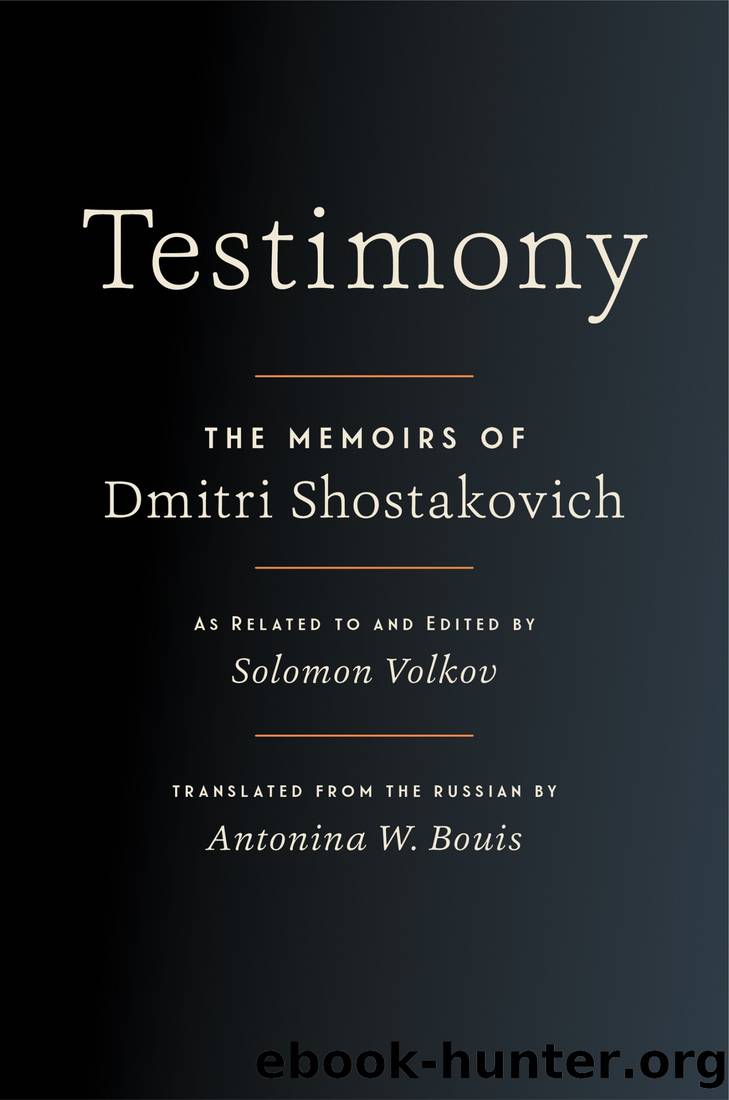Testimony: The Memoirs of Dmitri Shostakovich by Solomon Volkov

Author:Solomon Volkov [Volkov, Solomon]
Language: eng
Format: epub
Tags: Biography & Autobiography, Personal Memoirs, music, Genres & Styles, Classical
ISBN: 9780062987853
Google: l1I1EAAAQBAJ
Publisher: HarperCollins
Published: 2021-05-04T00:33:10.703550+00:00
IS a musical concept born consciously or unconsciously? Itâs difficult to explain. The process of writing a new work is long and complicated. Sometimes you start writing and then change your mind. It doesnât always work the way you thought it would. If itâs not working, leave the composition the way it isâand try to avoid your earlier mistakes in the next one. Thatâs my personal point of view, my manner of working. Perhaps it stems from a desire to do as much as possible. When I hear that a composer has eleven versions of one symphony, I think involuntarily, How many new works could he have composed in that time?
No, naturally I sometimes return to an old work; for instance, I made many changes in the score of my opera Katerina Izmailova.
I wrote my Seventh Symphony, the âLeningrad,â very quickly. I couldnât not write it. War was all around. I had to be with the people, I wanted to create the image of our country at war, capture it in music. From the first days of the war, I sat down at the piano and started work. I worked intensely. I wanted to write about our time, about my contemporaries who spared neither strength nor life in the name of Victory Over the Enemy.
Iâve heard so much nonsense about the Seventh and Eighth Symphonies. Itâs amazing how long-lived these stupidities are. Iâm astounded sometimes by how lazy people are when it comes to thinking. Everything that was written about those symphonies in the first few days is repeated without any changes to this very day, even though there has been time to do some thinking. After all, the war ended a long time ago, almost thirty years.
Thirty years ago you could say that they were military symphonies, but symphonies are rarely written to order, that is, if they are worthy to be called symphonies.
I do write quickly, itâs true, but I think about my music for a comparatively long time, and until itâs complete in my head I donât begin setting it down. Of course, I do make mistakes. Say, I imagine that the composition will have one movement, and then I see that it must be continued. That happened with the Seventh, as a matter of fact, and with the Thirteenth. And sometimes itâs the reverse. I think that Iâve started a new symphony, when actually things come to a halt after one movement. That happened with The Execution of Stepan Razin, which is now performed as a symphonic poem.
The Seventh Symphony had been planned before the war and consequently it simply cannot be seen as a reaction to Hitlerâs attack. The âinvasion themeâ has nothing to do with the attack. I was thinking of other enemies of humanity when I composed the theme.
Naturally, fascism is repugnant to me, but not only German fascism, any form of it is repugnant. Nowadays people like to recall the prewar period as an idyllic time, saying that everything was fine until Hitler bothered us.
Download
This site does not store any files on its server. We only index and link to content provided by other sites. Please contact the content providers to delete copyright contents if any and email us, we'll remove relevant links or contents immediately.
Kathy Andrews Collection by Kathy Andrews(11839)
The remains of the day by Kazuo Ishiguro(9001)
Spare by Prince Harry The Duke of Sussex(5199)
Paper Towns by Green John(5194)
The Body: A Guide for Occupants by Bill Bryson(5099)
Industrial Automation from Scratch: A hands-on guide to using sensors, actuators, PLCs, HMIs, and SCADA to automate industrial processes by Olushola Akande(5063)
Machine Learning at Scale with H2O by Gregory Keys | David Whiting(4314)
Be in a Treehouse by Pete Nelson(4054)
Never by Ken Follett(3960)
Harry Potter and the Goblet Of Fire by J.K. Rowling(3864)
Goodbye Paradise(3812)
The Remains of the Day by Kazuo Ishiguro(3414)
Into Thin Air by Jon Krakauer(3401)
Fairy Tale by Stephen King(3401)
The Cellar by Natasha Preston(3347)
The Genius of Japanese Carpentry by Azby Brown(3310)
120 Days of Sodom by Marquis de Sade(3276)
Reminders of Him: A Novel by Colleen Hoover(3122)
Drawing Shortcuts: Developing Quick Drawing Skills Using Today's Technology by Leggitt Jim(3084)
